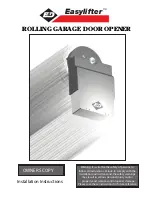
Dexxo Optimo RTS
Copyright © 2017 Somfy SAS. All rights reserved
5
EN
Fitting the arm onto the door and the trolley (Fig. 10)
In case the handle release system is positionned greater height than 1,80 m, it
will be necessary to lenghten the cord to make it accessible to all end-users.
[1].
Release the trolley using the manual release cord.
[2].
Bring the trolley up to the door.
[3].
Attach the arm to the door bracket and the trolley.
Adjusting and fastening the opening travel stop (Fig. 11)
[1].
Release the trolley from the runner using the manual release
mechanism and bring the door to the open position.
At this step, make sure that the cord from the manual release system could not
be caught aerwards in a prominent part of the vehicule (i.e. roofbars).
Do not open the door fully, but position it so that it does not reach its own travel stop.
[2].
Slot the travel stop (10) into the rail then turn it by 90°.
[3].
Position the travel stop against the trolley.
[4].
Moderately tighten down the mounting screw.
Do not tighten the mounting screw all the way down. Excessive tightening can
damage the screw and cause the travel stop not to remain in place.
Fitting the chain retainer pads (Fig. 12)
For chain rails only.
These pads are used to limit spurious noise linked to chain friction within the rail. Position each
of the pads in the first hole in the rail aer the travel stop.
Make sure that the pad is pressed in all the way so that its positioning pin is accessible outside
of the rail.
Checking the chain or belt tension (Fig. 13)
The rails are supplied ready tensioned and inspected. If necessary, adjust the tensioning.
The rubber or tension spring must never be fully compressed during operation.
Connecting the mains power supply (Fig. 14)
[1].
Remove the motor cover.
[2].
Fit the light bulb.
[3].
Connect to the mains supply.
Plug the power cable into a suitable power outlet that complies with electric
power requirements.
4 PROGRAMMING
4.1 Programming button description
+
SET
PROG
P0
P1
clignotant
éteint
¿[H
Légendes voyants
Buttons
Function
-
Press for 2 s: memorise remote controls
-
Press for 7 s: delete remote controls
-
Press for 0.5 s: select a setting value
-
Press for 2 s: start learning
-
Press for 7 s: clear learning and settings
-
Stop learning
-
Modifying a setting value
-
Using the forced mode
-
Operation indicator light (red)
-
End limit setting and self-learning indicator light (green)
P0
P1
-
P0 - P1 parameters indicator (green)
4.2 End limit setting and self-learning - Fig. 15
[1].
Press the “
SET
” button until the light comes on (2 s).
-
the
indicator light flashes.
[2].
Control the motor using the “
+
” or “
-
” buttons so that the transmission system runner
moves to link up with the trolley and closes the door.
-
Pressing and holding the “
-
” button
moves the runner in the close direction
.
Release the “-” button before the motor has time to force against the door.
-
Pressing and holding the “
+
” button
moves the runner in the open direction
.
[3].
Adjust the closed position using the “
+
” or
“-”
buttons.
Release the “-” button before the motor has time to force against the door.
[4].
Press “
SET
” to validate the closed end limit and start the self-learning cycle.
The door runs through a complete Open Close cycle and the
indicator light goes
out.
-
If the self-learning cycle was completed correctly, the
indicator light stays on.
-
If the self-learning cycle was not completed correctly, the
indicator light
continues to flash.
During the learning cycle:
-
If the door is moving, pressing any button will stop the movement and interrupt the learning
mode.
-
If the door is stopped, pressing “
SET
” once will exit the learning mode.
You can call up the learning mode at any time, even when the learning cycle has already been
executed.
WARNING
At the end of installation, it must be checked that the obstacle detection complies with
annex A of the standard EN 12 453.
4.3 Memorising the remote controls for operation in «Total
opening» mode - Fig. 16
Up to 32 control channels can be stored.
Running this procedure for a previously stored channel will clear it.
At this stage in the installation process, the Dexxo Pro motor drive unit is ready to run.
















































